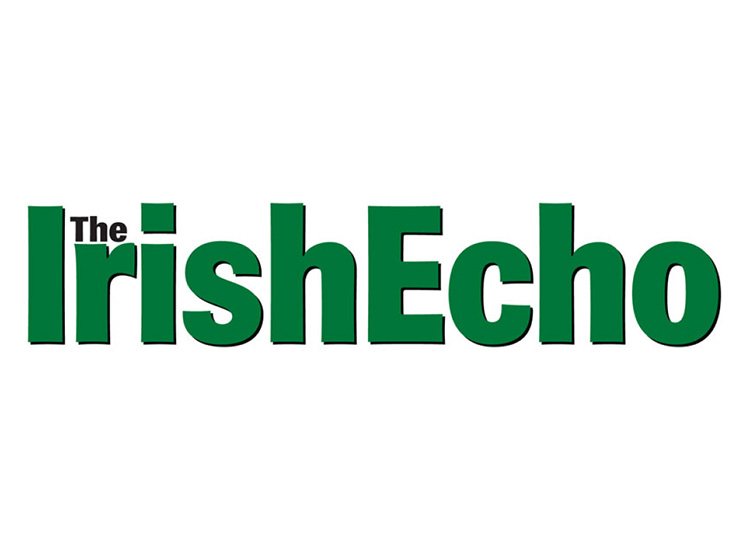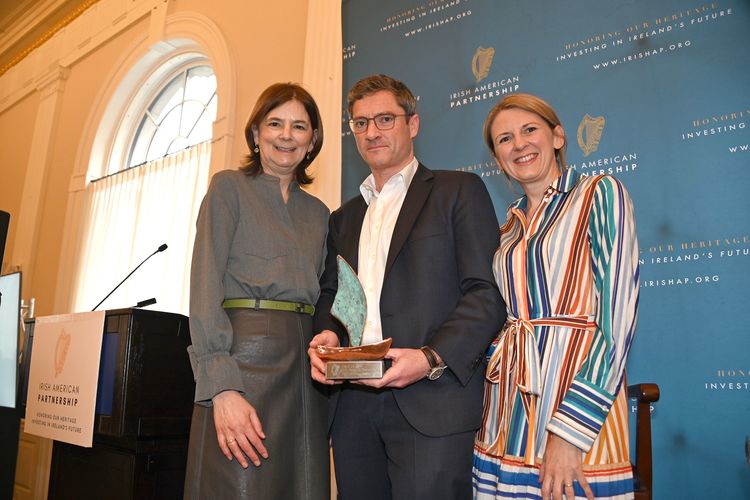[caption id="attachment_72142" align="aligncenter" width="540" caption="Minister Sammy Wilson speaking at the conference."]
The glory days of Belfast are back with a tech boom that echoes the city's world-leading role in building the Titanic 100 years ago, Northern Ireland's Minister for Finance and Personnel, Sammy Wilson, told the third annual New York/New Belfast Conference at Fordham University Lincoln Center last week.
"Titanic was the space shuttle of its time," Minister Wilson, MP, MLA, and former two- time mayor of Belfast, reminded the conference audience.
Today, he said, the North's tie to sterling was the latest in a series of factors prompting world-class firms to establish operations in the city, he said.
"We don't have the problems associated with the euro currency and there has been a flow of money to the U.K. because it is regarded as a safe haven," said Wilson, an economist by training.
The minister also spoke of a campaign, supported by politicians across the North, to cut its corporate tax rate to an alluring level that would "at least match that in the Republic."
Southern Ireland has long offered foreign investors a tax rate (12.5\ percent) well below the European average, which helped it to become the Celtic Tiger.
It will be decided next month in Westminster whether to allow the North set and then lower its own corporate tax rate - currently 24 percent, a number that applies throughout the U.K.
However, low tax rates alone are not be sufficient to attract investors, other speakers at the conference agreed.
Andrea Haughian, vice president of business development with Invest Northern Ireland, pointed to the fact that the Financial Times recently named Belfast as the top location in the U.K. for financial services technology investments.
Peace and the devolved government of the last five years had helped to attract firms, such as Visa, Hewlett Packard, and the New York Stock Exchange to Belfast, she said.
The NYSE is on its way to employing nearly 400 people in an expanding technology center, this following an initial investment in Belfast in 2008.
Initially, said Benjamin Chrnelich, senior vice president and chief financial officer of NYSE Technologies, "a lot of people rolled their eyes, and said, 'It's not Tokyo, Hong Kong, or London.'" However, he added, "I think Belfast has the ability to become the leading technology city in Europe, if not on a greater stage."
Minister Wilson said, "The best ambassadors are people like Ben," adding that satisfied customers are arguably more compelling than the list of advantages he gave for investing in Northern Ireland.
The North sits at the gateway to Europe and has a highly educated, English-speaking population, Wilson noted.
The same taglines have long been used by the Republic to make it the world's second largest software producer after the U.S.
However, the North did not become a Celtic Tiger, said Eamon Donaghy, head of tax with KPMG Belfast, "because traditionally the private sector was weak."
For example, he said, "There are 75 Scottish companies that are listed on the NYSE but just one in Northern Ireland, although we have one third of the population of Scotland."
Minister Wilson emphasized that the North enjoys the UK's best technology infrastructure: information travels at 40 gigabits per second, a speed available in about 98 percent of the region.
"The New York Stock Exchange discovered that connections between Northern Ireland and New York are faster than between New York and the West Coast," he said.
The North also combines the U.K.'s lowest office rental costs and its highest university graduation levels (over 50 percent), Minister Wilson said.
Andrea Haughian said after the session that typical office rentals in Belfast of $20 per square foot are "nothing," relatively speaking, and help make a business's operating costs 30 percent less than the U.K. average.
Minster Wilson said that the North presents itself today as a "hard business case," not a sympathy case.
In response to questions on when the global recession might end, he said, "I'm not convinced we have to wallow in recession."
Following up on the observation that there is said to be $1.7 trillion held in cash in the U.S. owing to a crisis in investor confidence, Minister Wilson, said, "It's estimated that U.K. firms are sitting on £700 billion in cash. Something has to be done with it, or shareholders will say, 'We want some.'"










